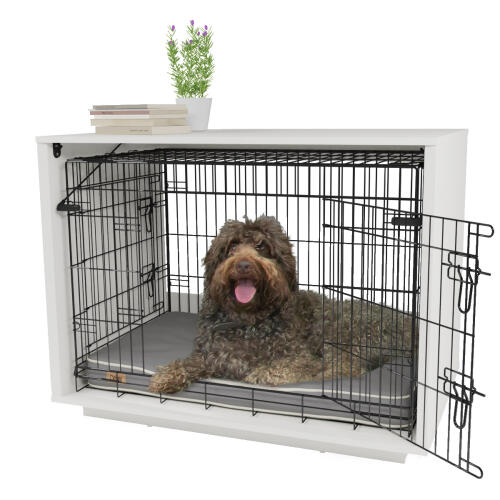The bond between a dog and their human is powerful, and when our furry friends are sick we feel their suffering greatly, and want to do whatever we can to help them feel better. Administering medication to your beloved canine companion can be a daunting task, but with the right approach, it can become a smooth and stress-free experience for both you and your dog. Whether it's through oral medication or using a syringe, knowing the proper techniques and creating a positive atmosphere is key. In this guide, we'll walk you through the steps to ensure your dog gets the medication they need while keeping them comfortable and happy.
Your vet prescribed medication, now what?
Whether your dog just had surgery or is suffering from a medical condition, it’s common for your vet to prescribe some type of medicine to help treat the issue. It's crucial to understand the dosage and administration instructions thoroughly, so be sure to take the time to ask them any questions you may have.
Understanding how and when to administer the medication is important. Additionally, enquire about any potential side effects to watch out for and when to follow up with your vet. Some dogs aren’t great with taking medication but being well-informed on how to make it as straightforward as possible sets the foundation for a smooth process.

They can run, but they can't hide from their medication!
Administering medications orally
Some dogs are better than others when it comes to sniffing out medicine that has been hidden inside their food bowls. If your dog has a brilliant sense of smell and refuses to eat the pill that means one thing - you’ll need to do it yourself.
Giving your furry friend medication doesn't have to be stressful. Here are five easy steps to make it a breeze:
- Treat time prep: First, gather your supplies and treats. You'll need the medication prescribed by your vet, some tasty treats your dog loves, and a calm, quiet space for administering the medication.
- Treat camouflage: Hide the medication in a delicious treat. Peanut butter, cheese, or even a slice of deli meat can work wonders here. Make sure the medication is well-hidden inside the treat.
- Positive association: Now, show your pup the treat with the medication inside, but don't give it to them just yet. Let them sniff and investigate. This helps create a positive association with the medication.
- The delivery: Once your dog is interested and excited about the treat, gently place it in their mouth, ensuring they swallow it. You can hold their mouth closed for a moment to make sure they've swallowed the medication.
- Reward and praise: Immediately after giving the medication, shower your dog with praise and extra treats. Let them know what a good pup they are! This reinforces the positive experience and helps build trust for future doses.
Remember, patience and positivity are key. If your dog seems anxious or hesitant, take it slow and offer plenty of encouragement. With practice and consistency, giving medication can become just another routine bonding moment between you and your beloved pet.
Administering medications through a syringe
In the event that your vet prescribes a medication that is liquid, you will need to give it your dog through a syringe. Fear not - while giving your furry friend liquid medication can seem daunting these five easy steps will leave you feeling like a pro:
- Set the scene: Find a quiet, comfortable spot where you and your pup can relax without distractions. This could be a favorite corner of the living room or a cosy spot in the kitchen. Just pick a place where you both can feel relaxed and nor distracted.
- Get prepared: Gather your supplies: the medication prescribed by your vet, a clean syringe, and a tasty treat to reward your pup afterward. Make sure to read the medication instructions carefully to understand the dosage and administration.
- Establish trust: You and your dog already have a strong bond but this is a new experience for both of you so you want to approach your dog calmly and confidently. Speak to them in soothing tones and offer plenty of pets and praise. And let them sniff and investigate the syringe so they feel comfortable with it.
- Administer the medication: Hold the syringe in one hand and gently secure your dog with the other. Depending on the medication, you may need to gently restrain them or use a helper to hold them still. Insert the syringe into the side of their mouth, between the teeth and cheek, and slowly depress the plunger to release the medication. Be patient and gentle, and try to avoid startling or overwhelming your pup.
- Reward and reassure: Once the medication is administered, offer your pup lots of praise and a tasty treat as a reward for their cooperation. This helps to create a positive association with the experience and builds trust between you and your furry friend. Finish off with some extra cuddles and playtime to reinforce the bond.
Remember, practice makes perfect! With patience, positivity, and a little effort, giving your dog medication can become a stress-free part of your routine. And always consult your vet if you have any concerns or questions about your dog's medication regimen.

Providing your dog with a comfy dog bed and dog crate is the perfect way to improve their sense of security when they’re sick
Omlet and your dog
Ensuring your dog's health and well-being is a top priority, and giving them medication is an important aspect of their care. Whether your vet has just prescribed your pup a pill or liquid medicine, following these techniques and maintaining a positive attitude will allow you to make the process easier for both you and your canine companion. At Omlet, we understand the bond between you and your pet, which is why we create products designed to support your dog and bring you both closer in every aspect of their life. From innovative dog crates to comfy dog beds to snuggly dog blankets, we're here to enhance your pet parenting experience.





Comments
There are no comments just yet